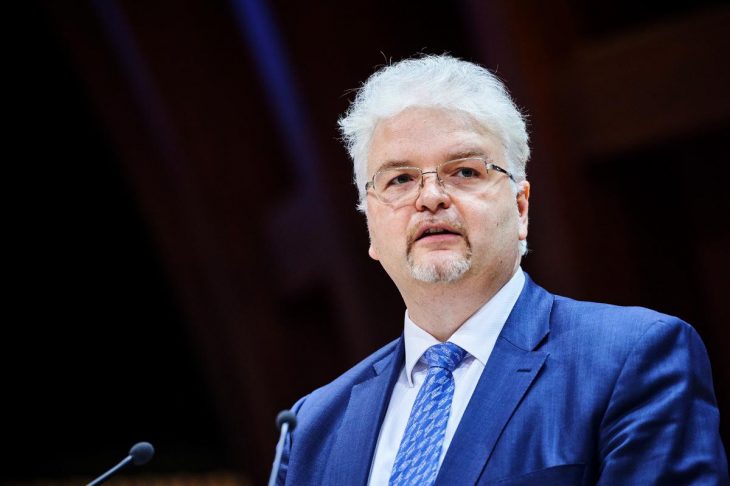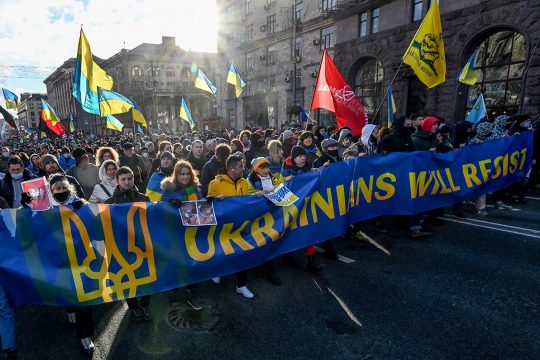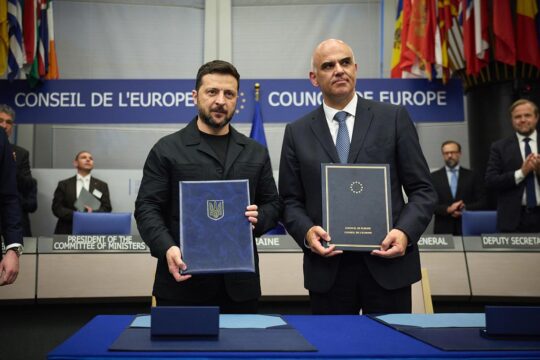JUSTICE INFO: Ukraine has deployed a full-scale legal strategy to denounce Russia’s aggression war. Has it proven successful in your opinion?
MYKOLA GNATOVSKY: From the outset, Ukraine decided to use every possible avenue to bring the matters related to Russia's aggression to the international courts. This is a consistent strategy since 2014. Ukraine made extensive use of interstate applications, at the European Court of Human Rights (ECHR); there’s the case that we jointly have with the Netherlands versus the Russian Federation. Then, of course, Ukraine also looked for ways of activating the International Court of Justice (ICJ); hence the case on the International Convention on the Elimination of All Forms of Racial Discrimination and the one on the financing of terrorism.
In both cases, I think things were moving fairly OK for Ukraine, but also very, very slowly, of course, in the best, so to say, traditions of international justice – at least before 2022.
And on international criminal responsibility?
In terms of international criminal responsibility, when the Russian aggression started - and one has to be very clear that it was in 2014, of course - Ukraine found itself in a situation where it wanted to bring the matter to the International Criminal Court (ICC). But it wasn't a state party to the Rome Statute because it had not overcome the obstacle that was created by an unfortunate opinion of the Constitutional Court from 2001.
Why had Ukraine not ‘fixed’ that issue, and gone for membership of the ICC?
Because no one thought it was a priority. It wasn't really on anyone's mind that that might be so urgently needed. There was a general consensus that this has to be addressed in due course, but it never happened. This is why there were two declarations under the Rome Statute, the one in 2015 giving the ICC the full possibility to look into crimes within its jurisdiction since the beginning of the international conflict between Russia and Ukraine. So, this is where we stood at the beginning of this new phase of the aggression, the full-scale war which started on the February 24 this year.
And you turned again to the ICJ?
We found out ourselves in a situation where some urgent action was desperately needed. And that explains the application to the ICJ in the genocide case.
How do you see ICJ’s decision to apply provisional measures?
I think one can fairly and safely say that at the preliminary stage this application has completely attained its goals. In the European Court of Human Rights, there was yet another request for interim measures. The ECHR was actually the quickest to grant these measures. The ICJ followed.
With all this going on, why the need for a tribunal on aggression?
This whole architecture has an obvious gap. And this is the crime of aggression. Of course, even if Ukraine manages to finally ratify the Rome Statute - now we have created all the constitutional preconditions, so basically it is just the decision of the parliament - it's also clear that Russia has no intention to ratify the Rome Statute.
But you can prosecute domestically, can’t you?
It can certainly be addressed at the domestic level, absolutely, but with the limitations pertaining to the domestic level, the issue of immunities in particular. However, this is not excluded, and I'm not saying that this is not an option. In fact, the issue of immunity for the crime of aggression could potentially be addressed, even domestically. But that's a little more complicated.
These concerns are why you think it must be an international tribunal - because it has the potential then to get over the immunity for a head of state?
Yes. And also the bigger issue, that of legitimacy.
Some people are suggesting that a special international aggression tribunal could be perceived to come from one side in a conflict.
Well, let's look at the options. Something that is done domestically is certainly narrower than something that can come from, at least, a group of states. In this respect, I think the proposal that was made by Philippe Sands in The Financial Times on the February 28 made sense, because there’s a clear historical precedent: Nuremberg came from one part of the conflict. And that's the closest analogy in terms of a multinational tribunal. Of course, formalistically speaking, the ICC is also a kind of a multinational effort with roughly two thirds of all of the existing states as parties to its statute. Which leaves us with a big part of the world not covered by the ICC’s jurisdiction. There isn't a perfect solution, I mean, unless some aliens come from outer space and do it for us. This has to be done by those who are able and those who are willing. This is frequently the case in international relations and international law, that the able, the willing are actually acting.
You've seen also other proposals for an aggression chamber that Ukraine could request to be formed by the Council of Europe – a regional option. How do you assess those?
I'm actually very, very much surprised in a positive sense that the idea of the Council of Europe has emerged at all. I've worked with the Council of Europe for many years. I spent 12 years on the European Committee for the Prevention of Torture, being its president for six years. I think it's a very interesting idea and it remains to be seen whether it is ready to do this and what exactly the legal mechanism would be. But in any case, it can be the Council of Europe or the European Union. These options are fine, even though in both cases we are talking about a regional method. One can claim that a war of aggression of this scale is certainly an international matter. It has the global sort of outreach, the global significance, not just for Europe, but of course Europe in the first place.
What about the concern that you might be diluting efforts by having so many different things going on?
Yes indeed, there's this criticism as well. First of all, there's a glaring gap in the jurisdiction. The crime of aggression is fairly well established in international law. I understand that not every state has even the relevant provisions in their criminal code, but the logic that was already used in the Nuremberg Tribunal in its judgment - that this crime contains the accumulated evil of the whole - is a valid logic. And what we see now in Ukraine is precisely this. We see all these multiple atrocities that are now increasingly more difficult to qualify as ‘just war crimes’. One would certainly be looking into crimes against humanity and even unfortunately, genocide, even though I'm very reserved about the whole notion [of genocide]. But once this large-scale invasion in Ukraine took place, this gap needs to be addressed substantively.
The whole idea is to complement the ICC, to emphasise the importance of it, to support it in every possible way, but to have a separate track for the crime of aggression. Because, interestingly enough, it is not very costly. The investigation proving this crime, writing a sound indictment for the crime of aggression is a much more straightforward business than proving war crimes and crimes against humanity. You have to prove much less. There's no technical detail that has to be investigated with thoroughness. There are no concrete victims that have to be interviewed and all the evidence gathered. There's no need to establish all those causal links.
But you do have to get the leadership in the dock, don't you?
You have to establish the exact roles of each particular individual in the hierarchy. This is a leadership crime. The task would be to see who has which role, who can actually influence the decisions in Russia, who actually takes the decision? The court will have to establish, for example, even for Vladimir Putin, that it's him who took the decision, and not that he was in the meantime held hostage by Sergei Shoigu [Minister of Defence], for example. The crime of aggression is a continuing crime. It's not just one decision on the February 21, or on February 20 of 2014. But still, you don't need a huge team in the office of the prosecutor. And you don't need too many judges to deal with this, either. So there can be mechanisms that can actually be used to make it resource friendly.
I fully recognise the concerns that the ICC prosecutor might have, that they actually need more resources and they don't want other structures to be financed at their expense. But I believe that these are not really comparable things, and that this can be done fairly quickly. On top of this, it can actually help the ICC because it might establish a background on which the ICC can proceed. With all our energy and with all the determination to resolve these issues quickly, it's clear that the investigation into war crimes and crimes against humanity will take years. It doesn't have to be the case for aggression.
How quickly would you like to see such a tribunal happen?
Well, I personally think that the momentum is there. The response from the international community has to be rather concentrated, and not so much spread in time. My opinions do not represent the opinion of the Ukrainian foreign ministry, but I would like to see the political decisions taken in the coming weeks, to see the indictment in a few months.
Are you saying that Ukraine would delegate its jurisdiction to such a tribunal?
Clearly, there should at least be partly a delegation by Ukraine of its jurisdiction over the crime of aggression to this international structure, but perhaps it can also be based on general international law. Then, there needs to be a decision taken on the possibility of in absentia trials. Lawyers will have their arguments. I'm not very much different from the mainstream who do not like in absentia trials and who do not like the experience of the Special Tribunal for Lebanon [the only international tribunal that could try individuals in absentia]. But on the other hand, I think there are weighty arguments to leave such a tribunal with the possibility to hold in absentia trials. In this case that should be considered. I would just leave it open. But in general, I think that this must advance seriously this year, for sure.
Interviewed by Janet H. Anderson








